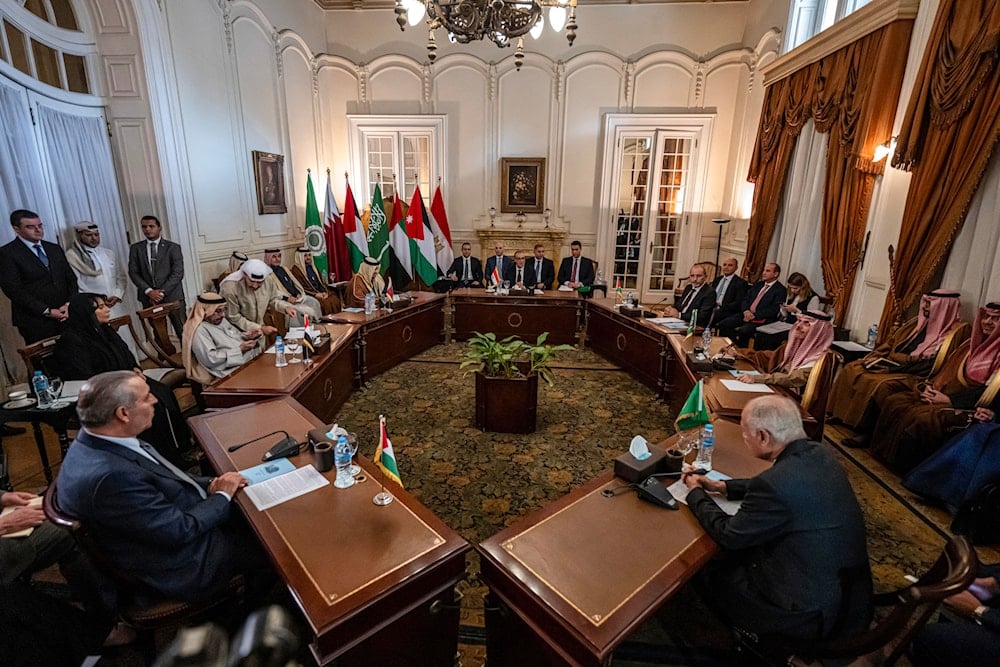Five Arab states reject any forced displacement of Palestinians
The meeting in the Egyptian capital Cairo came after US President Donald Trump floated an idea to displace Palestinians from the Gaza Strip to Egypt and Jordan.
-

Egypt’s Foreign Minister Badr Abdelatty (C) heads a meeting with ministers from Jordan, Saudi Arabia, Qatar, and the UAE, to discuss US President Donald Trump's proposal for Egypt and Jordan to host Palestinians displaced from the Gaza Strip, in Cairo on February 1, 2025 (AFP)
A meeting at Egypt’s invitation was held in the capital Cairo on Saturday at the level of foreign ministers, with the participation of Egypt, Jordan, the United Arab Emirates, Saudi Arabia, and Qatar, in addition to the Secretary-General of the Executive Committee of the Palestine Liberation Organization representing the State of Palestine and the Secretary-General of the Arab League.
The meeting came after US President Donald Trump floated an idea to displace Palestinians from the Gaza Strip to Egypt and Jordan.
The participating parties agreed to welcome the ceasefire agreement in Gaza and the prisoner exchange deal, commending the efforts of Egypt and Qatar in this regard and emphasizing the role of the United States in achieving the agreement, according to the meeting’s statement.
The participants also agreed to work with the Trump administration to achieve a just and comprehensive peace in the Middle East based on the "two-state" solution and to work toward eliminating conflicts in the region.
Furthermore, they affirmed their support for the efforts of Egypt, Qatar, and the US to ensure the full implementation of the agreement in all its phases and provisions, leading to a complete de-escalation.
They also stressed the importance of maintaining the ceasefire to ensure the delivery of humanitarian aid to all parts of Gaza and the removal of all obstacles to the entry of humanitarian assistance, shelter supplies, and recovery and rehabilitation requirements in a safe and appropriate manner.
The participating states emphasized the necessity of a full withdrawal of Israeli forces and categorically rejected any attempts to divide the Gaza Strip.
Additionally, they highlighted the need to empower the Palestinian Authority to assume its responsibilities in Gaza, alongside the West Bank and the eastern part of al-Quds, to enable the international community to address the humanitarian catastrophe inflicted on the Strip due to the Israeli aggression.
The statement also underscored the irreplaceable and indispensable role of the United Nations Relief and Works Agency for Palestine Refugees (UNRWA) and firmly rejected any attempts to bypass or diminish its role.
The Israeli occupation regime officially cut ties with UNRWA on Thursday, a move expected to heavily impact the delivery of critical services after 15 months of the war on Gaza.
Under the ban, UNRWA will no longer be permitted to operate on occupied Palestinian soil, and all contact between the agency and Israeli officials will be prohibited.
In this context, the meeting’s statement emphasized the importance of concerted international efforts to plan and implement a comprehensive reconstruction process in Gaza as soon as possible, ensuring that Palestinians remain on their land, particularly in light of their demonstrated resilience and unwavering attachment to their homeland.
According to the statement, this effort should contribute to improving the daily lives of Gaza’s residents, addressing internal displacement issues, and completing the reconstruction process.
The participants reaffirmed "full and continued support for the Palestinian people’s resilience on their land and their legitimate rights under international law," rejecting "any infringement on these inalienable rights, whether through settlement expansion, forced displacements and home demolitions, land annexation, or displacement efforts that encourage or coerce Palestinians to leave their land under any circumstances or pretexts."
Such actions threaten regional stability, risk prolonging the struggle, and undermine prospects for peace and coexistence, the statement warned.
It also welcomed Egypt’s intention, in collaboration with the United Nations, to host an international conference for Gaza’s reconstruction at an appropriate time, calling on the international community and donors to contribute to this initiative.
Moreover, the participating states urged the international community, particularly global and regional powers and the United Nations Security Council, to "begin the actual implementation of the two-state solution, addressing the root causes of tensions in the Middle East, primarily by reaching a just resolution to the Palestinian cause."
This includes establishing a Palestinian state on its full national territory while ensuring the unity of Gaza, the West Bank, and the eastern part of al-Quds in line with international legitimacy and the pre-June 4, 1967 borders, the statement pointed out.
In this context, the statement endorsed "the efforts of the international coalition to implement the two-state solution and actively participate in the international conference on resolving the Palestinian cause, which is set to be co-chaired by Saudi Arabia and France in June 2025."
Read more: 'Our people have thwarted displacement plots', Hamas' al-Hayya says

 5 Min Read
5 Min Read








